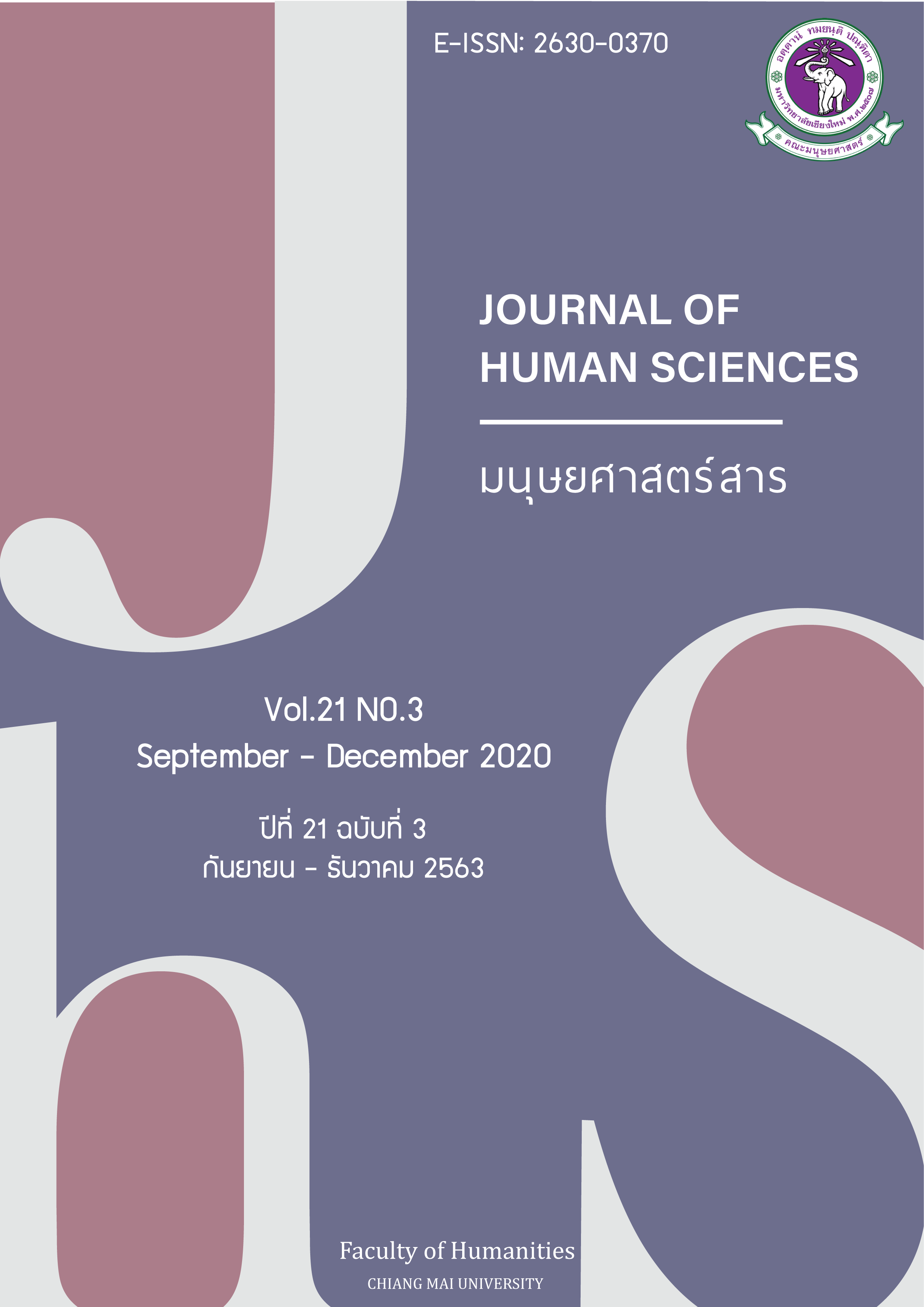ปัจจัยที่มีผลต่อแรงจูงใจในการเลือกเรียนภาษาเกาหลีระดับมัธยมศึกษา และระดับมหาวิทยาลัยในเขตภาคเหนือตอนบนของประเทศไทย
Main Article Content
บทคัดย่อ
งานวิจัยนี้มีวัตถุประสงค์เพื่อศึกษาเกี่ยวกับปัจจัยที่มีผลต่อแรงจูงใจในการเลือกเรียนภาษาเกาหลีระดับมัธยมศึกษาและระดับมหาวิทยาลัยในเขตภาคเหนือตอนบนของประเทศไทย โดยใช้แบบสอบถามเป็นเครื่องมือในการสำรวจแรงจูงใจในการเลือกเรียนภาษาเกาหลี สำรวจความคาดหวังของผู้เรียนภาษาเกาหลีหลังเรียนจบจากสถาบันการศึกษาของตน และศึกษาถึงปัจจัยส่วนบุคคลที่มีความสัมพันธ์กับแรงจูงใจในการเลือกเรียนภาษาเกาหลี จากกลุ่มตัวอย่างที่เป็นนักเรียนโรงเรียนมัธยมและนักศึกษามหาวิทยาลัยในเขตภาคเหนือตอนบนของประเทศไทย ที่เรียนภาษาเกาหลีเป็นวิชาเลือก วิชาโท หรือวิชาเอก จำนวน 400 คน ผลการวิจัยพบว่า 1) แรงจูงใจในการเลือกเรียนภาษาเกาหลีของกลุ่มตัวอย่างอันดับแรกคือ แรงจูงใจจากตนเอง 2) ความคาดหวังหลังเรียนจบจากสถาบันการศึกษาของกลุ่มตัวอย่างอันดับแรกคือ สามารถเข้าใจเพลง/ ซีรี่ส์/ รายการวาไรตี้เกาหลีได้เป็นอย่างดี 3) เพศมีผลต่อแรงจูงใจจากกระแสนิยมในการเลือกเรียนภาษาเกาหลีแตกต่างกัน 4) อายุมีผลต่อแรงจูงใจจากตนเองและแรงจูงใจจากสังคมแวดล้อมในการเลือกเรียนภาษาเกาหลีแตกต่างกัน 5) ระดับการศึกษามีผลต่อแรงจูงใจจากตนเอง แรงจูงใจจากสังคมแวดล้อม และแรงจูงใจจากหลักสูตรและสถาบันการศึกษาในการเลือกเรียนภาษาเกาหลีแตกต่างกัน
Article Details
เอกสารอ้างอิง
Alderfer, C. P. (1966). Differential importance of human needs as a function of satisfaction obtained in the organization (Unpublished doctoral dissertation, Yale University).
Chinakun, M. (2015). ræng chungchai thi mi itthiphon nai kantatsinchai lưak rian phasa kaoli nai sathaban son phasa khong prachachon nai krung thep maha nakhon [Motivation Affecting the Selection of Korean Language institutions of the people in Bangkok]. (Bachelor of Business Administration thesis, Silpakorn University).
Dailynews. (2018). Khon Thai tongkan rian phasa kaoli sung khun [Thai people need a higher Korean education]. Retrieved from https://www.dailynews.co.th/education/651765
Damron, J. and Forsyth, J. (2012). Korean Language Studies: Motivation and Attrition. Journal of the National Council of Less Commonly Taught Languages, 12. 161-188.
Domjan, M. (1996). The Principles of Learning and Behavior Belmont. California: Thomson Wadsworth.
Eadkhao, S. (2011). patchai thi song phon to kantatsinchai luak rian phasa yipun thi rongrian son phasa yipun nai krung thep maha nakhon [Factor Affecting the Selection of Japanese Language School in Bangokok]. (Master of Business Administration thesis, Rajamangala University of Technology Thanyaburi).
Gardner, R. C. (1996). Motivation and second language acquisition: perspectives. Journal of the Canadian Association of Applied Linguistics, 18. 19-42.
Gardner, R. C., & Lambert, W. E. (1972). Attitudes and Motivation in Second Language Learning. Rowley, MA: Newbury House.
Hanson, M. E. (1996). Educational Administration and Organizational Behavior (4th ed.). Boston: Allyn and Bacon.
Herzberg, F., Mausner, B., & Snyderman, B. B. (1959). The Motivation to Work (2nd ed.). NY: John Wiley & Sons.
Immigration Bureau. (2020). sathiti sotomo [Immigration Bureau’s statistics]. Retrieved from https://www.immigration.go.th/en/?page_id=3632.
Kaiwan, Y. (2010). lak sathiti wichai læ kanchai prokræm SPSS (Phim khrung thi song) [Principles of research statistics and using SPSS program (2nd ed.)]. Bangkok: Chulalongkorn University.
Kidd, J. R. (1973). How Adults Learn. NY: Association Press.
Kimsuvan, A. (2005). khomun phunthan kanchatkan rian kanson phasa tangprathet læ kanchai phasa tangprathet nai phak nưa (chabap phap ruam) [The basic information of the learning and teaching management and the use of foreign languages in the Northern part of Thailand]. Bangkok: The Thailand Research Fund.
Lovell, R. B. (1980). Adult Learning. NY: Halsted Press Wiley & Son.
Maharat, J. (2012). phruttikam læ khwamphungphochai nai kanluak rian phasa tangprathet nai sathaban son khong naksuksa radap parinya tri mahawitthayalai chiang mai [Behavior and Satisfaction in choosing to study foreign languages in teaching institutions of undergraduate students of Chiang Mai University]. (Research Exercise in Economics, Chiang Mai University).
Matichon Online. (2016). aochai ting kim chi Tho Po O sop PAT Kaoli phœm phrom pœt khosop - chalœi GAT / PAT lang æt mitchan set [Kimchi fans pleased. CUPT added Korean language into PAT, and will publish GAT / PAT exam-answer after admission]. Retrieved from https://www.matichon.co.th/education/news_180209
Ministry of Foreign Affairs. (2020). Current state of Korean residents abroad. Retrieved from http://www.mofa.go.kr/www/wpge/m_21507/contents.do.
Moore, K. D. (2009). Effective instructional strategies: from theory to practice. United States of America: SAGE.
Morgan, J. H. (1981). Maslow's Hierarchy of Needs. International Journal on Personal Relationships, 6(1). 75-93.
Office of the Basic Education Commission. (2016). rai chư rongrian thi pœt son phasa Kaoli sangkat samnakngan khana kammakan sưksakhan phưnthan (sophotho) [List of schools that offer Korean language instruction under the Office of the Basic Education Commission (OBEC)]. Bangkok: Office of the Basic Education Commission.
OBEC public relations. (2019). sophotho pathomnithet læ song mop khru kaoli toyot kan son phasa kaoli nai prathed thai [OBEC hosted an orientation and transferred Korean teachers to enhance Korean teaching in Thailand]. Retrieved from https://www.moe.go.th/สพฐ-ปฐมนิเทศและส่งมอบครู
Orapan, R., & Banlang, R. (2016). harue kap ekakkhraratchathut satharanarat kaoli [Conference with the Ambassador of the Republic of Korea]. Retrieved from https://www.moe.go.th/websm/2016/mar/116.html
Phannan, P. (2008). Korean Entertainment Media and The Appreciation of Korean Cultural Value among Thai Adolescents. Retrieved from http://research.krirk.ac.th/images/researchs/2013_07/35/usrfile_945867_190705.pdf
Root, E. (1999). Motivation and Learning Strategies in a Foreign Language Setting: A Look at a Learner of Korean. Minneapolis: Center for Advanced Research on Language Acquisition. University of Minnesota.
Skulthongaram, T., Katawee A., & Baitong, W. (2018). Motivation in Learning Korean Language: The Case Study of Korean Language Major Students at University of the Thai Chamber of Commerce, Thailand]. In L. Saothayanun (eds.), Conference Papers on the 2nd UTCC Academy Day, University of the Thai Chamber of Commerce (pp. 1599-1612). Bangkok: University of the Thai Chamber of Commerce
Spaulding, C. L. (1992). Motivation in the classroom. NY: McGraw-Hill.
Vroom, V. H. (1964). Work and motivation. NY: John Wiley & Sons.


